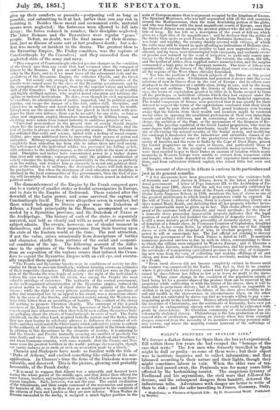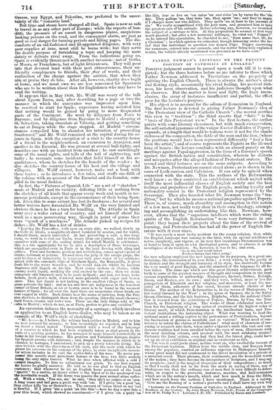WOLFF'S PICTURES OF SPA:NI SII LIFE. * WE foresee a darker
future for Spain than she has yet experienced. Till within these few years she had escaped the "homage of the race that write." The few men who formerly travelled in Spain might be dull or prolix—as some of them were ; 'but their object was to institute inquiries and to collect information; and they laboured according to their nature and their lights, though they might sometimes labour in vain. 'When the older race of tra- vellers had passed away, the Peninsula was for many years little affected by the bookmaking tourist. The suspicious tyranny of Ferdinand and his myrmidons, the civil wars that followed his decease, and the subsequent dangers from banditti, deterred the industrious tribe. Adventures with danger are better to write of than -to risk ; and the safer travelling in France, Germany, Italy,
• Madrilenia; or Pictures of Spanish Life. By 11. Drummond Wolff. Published
by Bentley. •
Greece, nay Egypt, and Palestine, was preferred to the uncer- tainty of the "romantic land." But time .andsteam have changed all that. Spain is now as safe to travel in as any other partof Europe ; while the reports of ban- ditti, the presence of an .esoort in dangerous places, suspicious- looking persons on the road, and the consequent alarm, are just as good as real danger for turning periods and filling pages. The dis-
comforts of on okl..foabioned and ill-appointed diligence, with very
poor supplies at inns, must be borne with-; but they serve the double purpose of furnishing a topic and keeping the more dainty or delicate rival away. FTCHIL the indications going on, Spain is evidently threatened with another invasion—not of Goths, or Moors, or Frenchmen, but of light litte.rateurs. They will pour into that devoted land with their pert obtrusiveness, their un-
friendly compliments to friends, their flux of words, and their realization of the charge against the satirist, that when they aim at praise they do bite. After all, however, charity does begin at home, and we must own we are less concerned for Spaniards who are to be written about than for Englishmen who may have to read the writing.
It appears that in May 1850, Mr. Wolff was weary of the talk about Epsom Races, and, after describing for a page or two the manner in which the annoyance was impressed upon him,
he resolved to start for Spain ; experience having satisfied him that nothing would be gamed by going to more frequented parts of the Continent. He went by diligence from Paris to Bayonne, and by diligence from Bayonne to Madrid ; sleeping at St. Sebastian, taking chocolate at -Vittoria, and getting something to eat at Burgos while the stage stopped. At Madrid "circum-
stances compelled him to abandon his intention of proceeding Southward," and Mr. Wolff remained at the capital during his so- journ in Spain, with the exception of a visit to the country-house
of a friend in the neighbourhood, an excursion to Aranjuez, and another to the Escurial. He was present at several bull-fights, and
describes one with an incident from another ; he saw unwillingly some of the usual sights, and tells of the toil of sightseeing, not badly ; he recounts some incidents that befel himself or his ac- quaintances, whom he sketches for the benefit of the reader ; he also sketches the country-house of his host and the village and villagers. Mr. Wolff cannot, however, make out a book with these topics ; so he introduces a few tales, and stuffs one-fifth of the volume with an account of the Escurial and its founder, com- piled in the usual fashion. In fact, the "Pictures of Spanish Life" are a set of " sketches " made at Madrid and its vicinity, differing little or nothing from the sketches of all kinds that appear every week and month in nu- merous periodicals, except in the circumstance of their being Span- ish. Even this to some extent has lost its freshness ; for several and better writers have forestalled Mr. Wolff on the very limited and obvious themes he has a turn for handling. The Attaché in Spain went over a wider extent of country, and set himself about his
work in a more persevering way, though in point of genus they were "much of a muchness." The Attaché picked up recipes for dishes ; Mr. Wolff has a list of drinks.
" Leaving the Post-office, with eyes on every side, we walked slowly up the Calle de Aleala, a magnificent street bordered by acacias, and for width, I should think, nearly unrivalled. At last perceiving a café, a fine large room, we went in to rest our limbs, weary from our journey, and to refresh ourselves with some of the cooling drinks for which Madrid is celebrated : this is a fine opportunity for me to give a description of these beverages, which are unequalled even in Paris or in the land flowing with sling and coblers. First and foremost, peerless and revivifying, comes agraz—pearl of drinks, talisman of potions. Pressed from the pulp of the unripe grape, the acid freshness of immaturity is tempered with pure water of icy coldness;
mixed with the camomile wine of Southern Spain, the Manzanillo., it gives fresh life to the weary traveller, and he would fain die whilst its luscious fragrance still lingers on his lips. Next comes orchata de challis, white creamy nutty liquid, soothing the soul excited by the sun ; then we drink orangeade and lemonade only to be made in Spain • and last not least leche helada, fresh goat's milk, rendered more palatable with sugar and beaten snow. This last liquid is not lacking in the smallest village of Spain, as goats pervade the land ; and as tea and beer are indigenous in the remotest corner of Great Britain, so ice or beaten snow is to be found in the meanest hamlet of Spain ; for all over the land there are mountains whose heads are ever capped in white. Such drinks bear the name of sorbetos, from the Per- sian sherbets, to distinguish them from the quesitos, (literally small cheeses,) hard frozen creams and water ices. These are the only things sold at the cafes in Madrid ; which do not, as at Paris, profess to give any eatables."
An excursion induces the necessity of a carriage ; which involves an application to an English horse-dealer, who may be taken as an example of Mr. Wolff's style of sketching
"Mr. L--- is, I believe, the solitary hack-jobber in Madrid, and to him we were referred for mounts ; to him accordingly we repaired, and in him
we found a friend indeed Unacquainted with a word of the language
of a country to which he had been originally taken as stud-groom in the suite of a sporting grandee, he has managed to make himself wonderfully at
home in his foreign residence. His gestures and Yorkshire dialogue inspire hisSpanish grooms with deference ; and, despite the manner in which he is cheated, he manages, I understand, to pick up a pretty tolerable living. His eyes twinkle with the shrewdness of his craft, and the smile with which he ir.w..a his sarcasms on the customs of the place, by some inexplicable muscu- iaraetam inelades in its curl the eyelet-holes of his nose. He never pos-
sewed this usually most prominent feature of the face, two little nostrils bang the only signs thereof. What he does when afflicted with a cold I cannot imagine. To him we unburdened our griefs. To our first request forlorses he gladly assented. He told us he was glad to find an English customer; that whenever he let an English horse possessed of the least “sperrit' 'to a native, an injury either to the biped or to the quadruped was the/inevitable/result. if the horse was passive the poor animal alone suffer- . With a wink, You see, air,' he said, 'they ain't no judges of an 'ores. A bag mane-and tail goes a great way with 'em. If I gives 'em a good 'un, they either lulls 'im or theirselves. The amount of 'uman blood on my 'ead intent If I gives "em a quiet 'nn like thie—here he dugs spur into a poor thin beast, which showed no resentment—' if I gives 'em a quiet like this, four or five on 'em takes 'un and rides 'un by turnslor the 'Ole ; day- They _gallops 'un, they trots 'im, they ,spurs'.un...and they're angry if I charges more nortwo dollars. They spoils '.un at last to the amount.of six.' We really.sympathized with the poor man, and promised.him to take the greatest care of his animals. Before selecting any, however, we broached the subject of a carriage to him. At this proposition he seemed at _first very much puzzled ; but after a few moments soliloquy, he cried out Pepper!' As he uttered this ejaculation, he chuckled to me, 'Rum name that, sir, for a Christian ' ; in which opinion we coincided, though labouring under the be- lief that the individual in question was named Pepe. Pepper answering the summons, entered into our counsels, and the matter being duly explained to him, the vehicle already mentioned. was procured as we have seen."



























 Previous page
Previous page